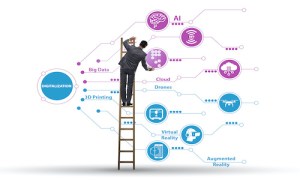Digital transformation framework is the blueprint of our time. Whether you want to refer to our current moment as the New Normal, the Fourth Industrial Age, the era of the digital imperative, or something completely different, one thing is for certain: we’re living in a transformative time.
When it comes to digital transformation innovation, the future is limitless. But before we can get to the promised land of 5G, VR holidays, the Internet of Things, and AI-powered everything, there’s one thing we need to address – many businesses aren’t prepared for a digital world.
Digital transformation is reshaping the landscape
It’s true that digital transformation is a buzzy term. And it’s also true the Covid-19 pandemic has accelerated the shift towards digital solutions. On top of that, study after study has shown the benefits that digital transformation provides for businesses.
For instance, according to the State of the Connected Customer report, 85% of high-performing marketing teams using IoT-based marketing say that it’s effective or very effective in helping to create cohesive customer journeys.
The same report states that 83% of business buyers expect companies to use technologies to create better experiences. Despite all of this, some organisations don’t know how to escape from the shadows of the slower, less connected world they’re still operating in.
These businesses will find it difficult to survive in the rapidly changing landscape. These businesses need to establish a digital transformation framework – and fast.
Why do you need a framework?
Digital transformation refers to the process by which companies modernise their operations by incorporating digital technologies. An effective digital transformation strategy enables businesses to build more meaningful relationships, maximise revenue opportunities, and streamline business processes. Some digital transformations are revolutionary, turning traditional businesses into hyper-engaged digital disruptors. Don’t forget that not long ago, Netflix sent DVDs by mail.
But an effective digital transformation requires an effective digital transformation framework. Businesses need to know where they want to go, how they want to get there, and who they want to take along for the ride. They need to be strategic.
Luckily, there are some simple focal points to consider when constructing a digital transformation strategy. Let’s have a look at the five main pillars of digital transformation.
The 5 pillars of digital transformation
1. The customer experience
Just as the customer experience is at the heart of a good business, it’s also at the heart of a good digital transformation strategy. Everything starts and ends with the customer, so new digital technologies should focus on improving the customer journey.
2. Culture and leadership
One of the biggest factors in whether or not a digital transformation strategy will be successful is the thought-leadership behind it. It’s not only technologies that need to change; it’s people as well. Company culture starts at the top, so getting the CEO on board is paramount.
3. Operational agility
Being able to maintain operational agility is a priority in the New Normal, so businesses should leverage integrated technologies that nurture this agility. A digital transformation framework should focus on accelerating processes, freeing up the workforce to maximise their unique talents, and phasing out slow or complex legacy systems.
4. Workforce empowerment
Digital transformation is a cultural shift. It’s important to get the workforce to understand the mission of the company and the reasons behind the digital transformation. This may be easier said than done, as the threat of technological unemployment could make some employees wary. It’s important to highlight how empowering digital transformation is: this is something that will make their jobs easier, not more difficult.
5. Digital technology
A digital transformation framework can take businesses to brave new worlds, but only if they have enough fuel to get there. Check out Salesforce CRM solutions like Sales Cloud, the Customer 360 Platform, and Service Cloud. The Salesforce Platform even lets users create apps with zero knowledge.
Common digital transformation framework mistakes to avoid
It’s crucial for businesses to understand what they want to accomplish through digital transformation, but it’s also important to avoid some of the common pitfalls.
Here are some of the common mistakes that businesses make when creating a digital transformation framework:
There’s no clear consensus on goals
Adopting new technologies for the sake of it isn’t particularly transformative. Adapting them to solve problems is. Businesses should make sure that the technologies they want to incorporate actually address their pain points. Then they can move on to mapping out their short-, mid- and long-term digital transformation goals.
The workforce isn’t prepared
New technologies can help automate mundane, repetitive tasks, freeing up the workforce to concentrate on more creative endeavours. They also require different skill sets, so skilling up the workforce to prepare for any new requirements will help businesses stay ahead of the curve.
You’re flying solo
Imagine snapping awake in an empty Cessna: there are no passengers, no pilot. You’re suddenly at the controls but have never flown a plane before. You have no visibility, no idea how to operate the systems, and no idea how to navigate. How could you possibly get where you’re going?
The same question applies to any new digital transformation project, which is why having an experienced partner is key. Before undertaking a digital transformation, make sure to leverage the expertise of partners, tech vendors, or consultants.
A digital transformation framework enables change
In the end, digital transformation is really business transformation. If that sounds daunting, perhaps it should be. It takes courage to awaken the giant sleeping within us, after all. But digital transformation is also a super enabler. It enables businesses to explore uncharted territories, reach their potential, and galvanise their workforce.
A digital transformation framework provides the opportunity for fundamental change. Identify your business’s higher purpose – and then transform to fulfil it. But don’t wait another moment; the future is waiting.
For more information about digital transformation, check out The Impact of Digital Transformation in Times of Crisis.
























